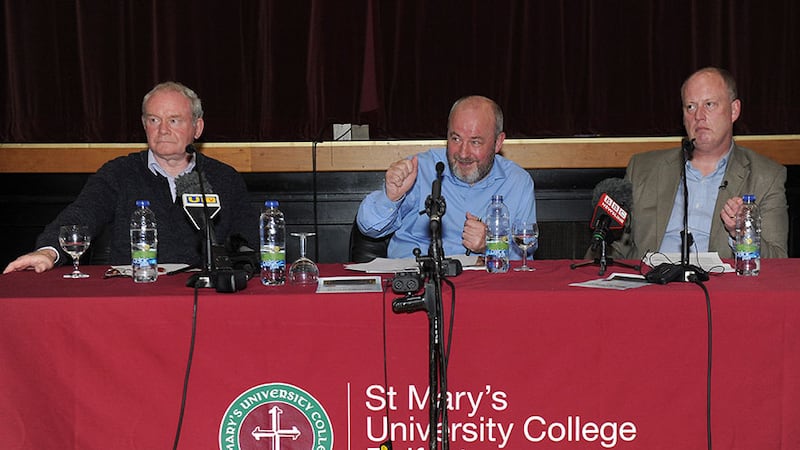Six weeks ago, I sat near Pat’s Finucane’s family as the frosted skylight ceiling of the Nisi Prius court softly cast a bright downward hue.
They listened closely as Mr Justice Stephens once again found the British government in violation of its procedural obligations under Article 2 of the European Convention on Human Rights – the right to life.
Justice Stephens said: ``It was submitted, and I agree, that the adoption of a regime of ‘murder by proxy’ whereby the murder of individuals within a state’s jurisdiction was facilitated by agents of the state does negate the very foundations of the Convention, and indeed of a democratic society.''
Six days ago in St Mary’s University College on Belfast’s Falls Road, I again sat near the Finucane family.
This was an intensely emotive court of public opinion (or at least some opinions) on Thursday evening, with deputy first minister Martin McGuinness and PSNI chief constable George Hamilton on a public panel.
It wasn’t a clichéd ‘uncomfortable conversation’. The intent of both protagonists even seemed to outstrip the content of their presentations.
At one point, George Hamilton declared: ``I’m accountable to a Policing Board that’s got four Sinn Fein members on it, and an SDLP representative… They selected me. They recruited me. They hold me to account. I’m not answerable to the secretary of state. I’m not answerable to the British government… I’m not going to be fettered by secretaries of state, prime ministers or anyone else. My accountability body is the Policing Board and I’m very happy that it rests there.''
He’s already collapsed the HET because of Professor Patricia Lundy’s ground-breaking research which exposed the body’s endemic lack of independence and impartiality. He’s ended the retiring and rehiring of ex-RUC officers on agency contracts. But for democrats, those are ‘floors’ not ‘ceilings’. And Mr Hamilton’s personal and policing vocations will be measured by his constant actions in power.
Significant challenges were raised. Publish the collusion and shoot-to-kill reports – Stevens and Stalker/Sampson. Restore the minimalist staffing (just one officer) to the inquest of mass murder in the 1971 Ballymurphy massacre. Stop battling the McGurk Bar families in court and accept the Police Ombudsman’s 2007 finding of “investigative bias” by the RUC falsely blaming the IRA. Address ‘old mode’ policing being used against people with so-called ‘dissident’ political views.
The ball (and the opportunity) is now in Mr Hamilton’s court. If he embraces the goodwill which democrats will afford, then he could swiftly leave other actors having to catch up with positive initiatives on the past – including republicans, unionists and the British government.
But the challenges weren’t all one way. Martin McGuinness put it up to both republicans, unionists and the British government, when he outlined how collusion is “undoubtedly going to be the biggest issue and the biggest story that we have seen”.
Mr McGuinness also crucially moved the language of republicans into new space, stating: ``Republicans did a terrible thing whenever they buried the people that are called ‘the Disappeared’. It was a very cruel thing to do, and it caused immense hardship on top of the killing of a loved one.''
Democrats should join all these dots.
The world has changed when a High Court judge accepts the collusion thesis, stating it negates the ``very foundations… of a democratic society''.
The world has changed when a PSNI chief constable tells a British prime minister to butt out of his work because he’s answerable to a locally appointed Policing Board, including Sinn Fein representatives – and happy with that.
The world has changed when a republican leader describes certain IRA actions by some IRA members as ``terrible'' and ``very cruel''. Very cruel.
New realities must be taken into account, but this cannot - particularly in the case of truth - happen at the expense of old ones.
Some elements of the British government are still foolishly fighting the past from a platform of moral emptiness – impossibly trying to retain elite political and editorial control. (Look at Pat Finucane's case.)
And many families who suffered at the hands of the British state (including the RUC), and the IRA, and other groups, will now want much more than just the words spoken in St Mary’s last week. Their respective demands for truth won’t go away - not least unveiling the gender impact of our conflict.
Presumably both Mr Hamilton and Mr McGuinness weren’t just talking to the audience. They were also talking to each other and their own sides. They were saying the time for speaking ‘lines’ is over. And the time for talking truths has arrived.
Delivering truth is now a key to developing trust in the time ahead.
j.kearney@irishnews.com








